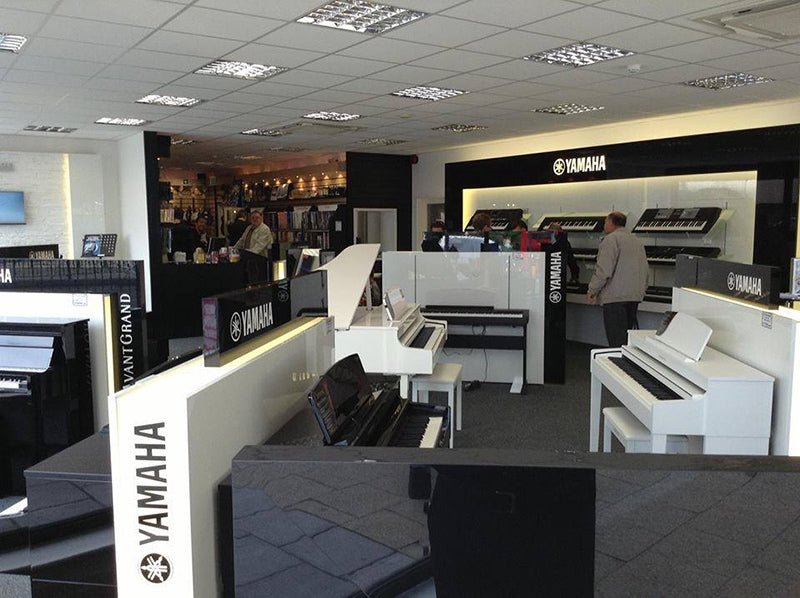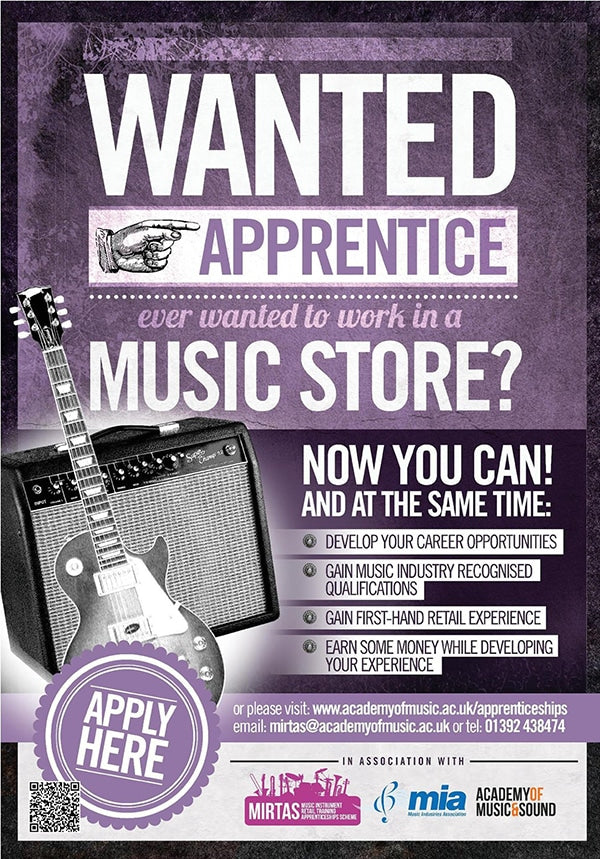From December 2013 and for several years afterward I worked as a project manager in the UK for the Academy of Music and Sound, managing MIRTAS: the Music Instrument Retail Apprenticeships Scheme.
This was a new and exciting program, one which had successfully and uniquely won a grant for 1.3 million pounds sterling, specifically to support the music instrument retail sector. It should be made clear that there were many sectors competing for this funding, and it was not a pre-allocated music industry-related government fund. Competition for the grant came from many sectors within the UK, including engineering, science and technology and so on. To win this for the music instrument retail sector was quite significant.
Up until that time, there had never existed any industry-specific retail qualifications to represent all the knowledge and skills that highly-capable staff were gaining in their field. Sadly, they had nothing “official” to show for their abilities to any future employer. For many young people starting out in music instrument retail, this was a great hole in the education world, one which MIRTAS would seek to remedy by developing two new industry-specific qualifications. These were the BTEC (Business and Technology Education Council) Level 2 in Music Instrument Retail Knowledge (for year one, progressing to Level 3 in year 2) and, Music Instrument Retail Skills NVQ (National Vocational Qualification). These qualifications were developed by the MIRTAS team, including myself, and were then introduced via the Pearson Edexcel education and examination body.
Logistically and technically, this was a mammoth national project and also a rewarding one. It was my job to find reputable and eligible retailers from throughout the UK that would be willing to take on an apprentice for at least the initial year. Next, I had to find suitable apprentices that both qualified for these limited golden opportunities, and had the ability to consistently physically attend their placement in store, based on their catchment and travel arrangements, should they qualify. It was necessary to have basic good grades in math and English, and have access to a laptop for online training and be able to count on a dependable commute.
After the MIRTAS qualifications had been developed, I trained to become an Assessor, trained two national regional mentors to likewise become Assessors, assessed the apprentices, and delivered the qualifications to the qualifying apprenticeship students. Additionally, the role included interviewing applicants; replacing those that did not continue on with the program; sourcing and delivering funding; handling promotion, marketing, and training; and keeping up to date with each student’s modular progress within their qualifications – all according to the fast-moving academic timetable to keep the students on track.
You may still visit the original MIRTAS Facebook page at this link, and check out just some of the music stores we worked with.

MIRTAS partner Manson’s Music Shop, Exeter, UK. Courtesy of Manson’s Music Shop.
It was an incredible project, with many hurdles to overcome, and new ground to pioneer. In total, we placed over 120 apprentices throughout the UK, ranging in age from 16 upward. The stores were wide-ranging in nature and included dedicated electric guitar and bass shops, brass and woodwind retailers, piano companies, chains, and independents. If you left school at the age of 16 at the start of this project and loved music and musical instruments, this apprenticeship program was made for you. It proved to be very popular. How so?
Well, this brings us back to the question posited at the start of this article. What’s in a name? If I said to you, “I worked for MIRTAS,” that would likely mean nothing to you – until you found out about the project and importantly, its reputation. Along with a huge amount of initiative, countless hours of communication and hard work, the MIRTAS project garnered success largely due to the good reputations of the stores involved. That, and the passion people have for music, young and old alike.
But just how important is reputation? How seriously do people take what’s in a name?
Perhaps this example may provide some small insight. Returning briefly to my own retail years in the early “noughties,” I still recall to this day one particular customer. I can’t remember what he had purchased, but I do remember filling out the invoice and asking his name. “It’s mister Aughneans,” stated our customer. “Could you spell that for me please, sir?” I asked, just wanting that bit of clarity, you know. “Of course. It has an apostrophe,” he said. “O, apostrophe, capital N, e, a, n, s.” “Oh! Mister Onions,” I delighted. “No!,” he retorted. “It’s O’NEANS!,” placing additional emphasis on the O. “Thank you very much Mr. O’Neans,” I concluded and wrote out the rest of the invoice hoping for no further complications with phonetically nightmare encumbered address details. I resisted the urge to compliment him with, “You must really know your…” nah – bad idea. He was happy – I was happy.
Yes, it mattered to Mr. O’Nions how you pronounced his name. It mattered a whole lot. And rightly so. His view of himself and how others view him were significantly important to him, and he wasn’t about to have some young staff lad misrepresent him as some common garden vegetable. His reputation would surely suffer and we didn’t want that!

Call any vegetable…courtesy of Pexels.com/Anna Shvets.
By subtle contrast, I once worked with a Ms. D’eath. She was one of the most alive, industrious and hard-working people I can think of. She always had a project underway at home and in her spare time spent hours doing volunteer construction work. Tough and kind. She pronounces her name D’eath and not Death but isn’t particularly hung up about it either. No pun intended.
So, again, what’s in a name? When MIRTAS started it was an unknown, but thanks to its rapidly-publicized notoriety and the reputation of the stores involved, the name grew rapidly. Perhaps not like wildfire, but within the family-like network of music instrument retailers, combined with the press we received in industry trade magazines, shopkeepers and business managers really got behind the scheme. In fact, it would have been almost impossible to keep a lid on it, as the sector was crying out for affordable and reliable staff. Our store managers believed in helping to give young people a new and exciting opportunity in the musical instrument world by training them on the job, and now, they would have legitimate qualifications to take forward in their future careers, something to give evidence to their initiative and their achievements.

MIRTAS partner Hartnoll Guitars, formerly Griffin Guitar Center, Plymouth, UK. Courtesy of Hartnoll Guitars.
In some way the MIRTAS project would become something of a self-fulfilling prophecy, as the vacancies were identified and then filled, for either year one or year two starters, and eventually all our cohorts would complete the syllabus. At the time, distance learning became retitled, to the newer term you may recognize today as blended learning. This meant our regional mentors could contact our apprentices both in-person for video and audio-based assessments, and aid with additional consultations online for further support when and where needed.
The project ran its natural course and was as sustainable as the funding would permit. Most apprenticeship placements would run for either 12 or 24 months, during which time, the supporting retailer could continue to be eligible for drawing down funding on a quarterly basis.
Given that the cohorts filled most of the identifiable vacancies nationally really went on to show how much of a need there was for affordable staff. As these positions became filled, (or in frequent cases were created as new opportunities), MIRTAS assisted the UK music instrument retail sector in reducing their operational staffing costs. Largely this program came to completion as a result of a finite amount of funding.
For me, the greatest highlight was seeing our young apprentices grow in their own confidence levels, take ownership of their roles and responsibilities, and provide meaningful assistance to the general public. They really came into their own stride in a field that they cared about. Observing the transition from introverted and shy to confident, informative and representable young adults was a real privilege. They were on their way to making a good name for themselves – their reputations.

MIRTAS partner Musicland, with locations in Bromley and Romford, UK. Courtesy of Musicland.



